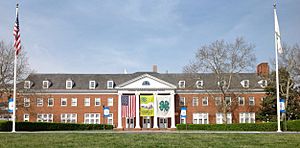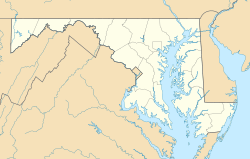Chevy Chase, Maryland facts for kids
Quick facts for kids
Chevy Chase, Maryland
|
|
|---|---|
|
Various neighboring areas
|
|

The former 4-H Youth Conference Center, which is to be redeveloped into senior housing
|
|
| Country | |
| State | |
| County | |
| Established | 1890 |
Chevy Chase is a well-known area near Washington, D.C.. It's not just one single place! Instead, it's a common name for a group of areas. These include a town, several villages, and an unincorporated area in southern Montgomery County, Maryland. There's also a neighborhood in northwest Washington, D.C., called Chevy Chase.
Most of these places got their name from a plan in the late 1800s. A developer named a new suburb "Chevy Chase" after an old land grant from colonial times. Today, Chevy Chase is mostly a place where people live. It's right next to Friendship Heights, which is a popular area for shopping. Chevy Chase is also home to fancy private clubs like the Chevy Chase Club. Many important politicians and people from Washington, D.C., are members there.
According to information from 2008-2012, Chevy Chase was one of the "most educated towns in America." Over 93 percent of adults living there had at least a college degree. It was also one of the "most affluent towns," meaning it had a very high average income.
The name "Chevy Chase" comes from "Cheivy Chace." This was the name of a piece of land given to Colonel Joseph Belt in 1725. The name also has a connection to a famous battle from 1388. This battle was fought between Lord Percy of England and Earl Douglas of Scotland. They were fighting over hunting grounds in the Cheviot Hills. This battle was remembered in a famous old song called "The Ballad of Chevy Chase."
Contents
What is Chevy Chase?
The area known as Chevy Chase is actually made up of several different parts. These parts are located in southern Montgomery County:
- The Town of Chevy Chase
- Chevy Chase, which is a census-designated place (a specific area defined for collecting population data)
- Several incorporated villages, which are small, self-governing communities:
Chevy Chase also includes a neighborhood in northwest Washington, D.C.. Even the United States Postal Service uses "Chevy Chase" for some addresses outside these specific areas. For example, the town of Somerset and parts of other neighborhoods use the Chevy Chase postal code.
History of Chevy Chase
Chevy Chase has a rich history, especially how it grew into the community it is today.
Building a New Suburb
In the 1880s, a senator named Francis G. Newlands from Nevada and his business partners started buying farmland. They bought land in Maryland and just inside Washington, D.C. Their goal was to build a new residential area, a "streetcar suburb," for people working in Washington, D.C. This was happening as the Washington streetcars system was growing.
Newlands and his partners started The Chevy Chase Land Company in 1890. This company eventually owned over 1,700 acres (about 6.9 square kilometers) of land. This land stretched along what is now Connecticut Avenue.
Early Rules and Restrictions
The Chevy Chase Land Company wanted to make sure that only wealthy people lived in their new suburbs. They also had rules that limited who could buy land. For example, property deeds required that only expensive single-family houses could be built. While the deeds didn't directly say "no non-white people," the high cost of the houses made it very hard for anyone but the wealthiest non-white people to afford the land. Houses had to cost at least $5,000 on Connecticut Avenue and $3,000 on side streets. The company also banned stores from residential areas.
The first person to live in Chevy Chase was Leon E. Dessez. He and another architect, Lindley Johnson, designed the first four houses in the area.
Chevy Chase Lake and the Streetcar
The Land Company built a dam on a stream called Coquelin Run. This created a man-made lake called Chevy Chase Lake. The lake provided water for the coal-powered generators that ran the streetcars. The streetcar became very important for the community. It helped people get to work in the city and even ran errands for residents.
Chevy Chase Lake was also the main attraction of the Land Company's "trolley park." This park was a fun place for boating, swimming, and other activities. It was meant to attract city people to the new suburb. The Land Company also built a hotel, which opened in 1894 as the Chevy Chase Spring Hotel. It was later renamed the Chevy Chase Inn. However, the hotel didn't attract enough guests, especially in winter.
The Chevy Chase Club
In 1892, Senator Newlands and other members of the Metropolitan Club started a hunt club called Chevy Chase Hunt. This club later became the Chevy Chase Club. In 1894, the club moved to a property that used to be a farm. They added a six-hole golf course in 1895 and bought the land in 1897.
Changes in the 20th Century
In 1906, the Chevy Chase Land Company stopped a proposed housing development called Belmont. They found out that the developers planned to sell lots to African Americans. The company argued in court that this was wrong.
By the 1920s, many property deeds in Chevy Chase included "restrictive covenants." These were rules that prevented homes from being sold or rented to "a Negro or one of the African race." Some also stopped sales or rentals to "any persons of the Semetic race" (meaning Jews).
By World War II, these restrictive rules started to disappear from real estate deals. In 1948, the Supreme Court made a decision in the case of Shelley v. Kraemer that made all such rules illegal.
In 1964, a journalist wrote that the Chevy Chase Country Club did not allow "Negroes" or "one ethnic group of Caucasians" (meaning Jewish people) to be members. The club president denied this, saying that while they had no African-American members, they did have several Jewish members.
In 1903, the old Chevy Chase Inn was bought and became the Chevy Chase College and Seminary. It later became Chevy Chase Junior College in 1927. In 1951, the National 4-H Club Foundation bought the property. They turned it into their Youth Conference Center. For many years, this center hosted the National 4-H Conference and the annual National Science Bowl.
Chevy Chase Today
In 2021, the National 4-H Club Foundation sold the conference center. As of 2022, the plan is to build a senior living community there.
Education in Chevy Chase
Students in Chevy Chase attend schools run by the Montgomery County Public Schools. Depending on where they live, children go to Somerset, Chevy Chase, or North Chevy Chase Elementary School. These elementary schools then feed into Silver Creek Middle School, Westland Middle School, and Bethesda-Chevy Chase High School.
There are also private schools in Chevy Chase, such as Concord Hill School, Oneness-Family School, and Blessed Sacrament School. The Rochambeau French International School used to have a campus in Chevy Chase.
Notable People from Chevy Chase
Many interesting people have lived or currently live in Chevy Chase.
Current Residents
- Ann Brashares – a well-known author
- John Carlson – a professional ice hockey player
- Marvin Kalb – a famous journalist
- Brett Kavanaugh – an associate justice on the United States Supreme Court
- Tony Kornheiser – a television host for ESPN
- Howard Kurtz – host of the Fox News program Media Buzz
- Collin Martin – a soccer player
- Chris Matthews – a political commentator
- Jerome Powell – the current Chairman of the Federal Reserve
- John Roberts – the Chief Justice of the United States
- A. B. Stoddard – a political commentator
- George Will – a conservative commentator
Former Residents
- Yosef Alon – an Israeli Air Force officer
- Jamshid Amouzegar – a former prime minister of Iran
- Tom Braden – a journalist and author
- David Brinkley – a famous journalist
- John Charles Daly – a media personality
- Mark Ein – an investor
- Bill Guckeyson – an athlete and military aviator
- Josh Harris – an investor and sports team owner
- Ed Henry – a journalist
- Richard Helms – a former director of the Central Intelligence Agency
- Genevieve Hughes – one of the original Freedom Riders
- Hubert Humphrey – the 38th vice president of the United States
- Gayle King – a television anchor
- Ted Lerner – owner of the Washington Nationals baseball team
- Anthony McAuliffe – a US general
- Sandra Day O'Connor – a United States Supreme Court Justice
- Hilary Rhoda – a model
- Nancy Grace Roman – a former NASA executive
- Peter Rosenberg – a media personality
- Danny Rubin – a basketball player
- Mark Shields – a political columnist
- Karl Truesdell – a US Army major general



